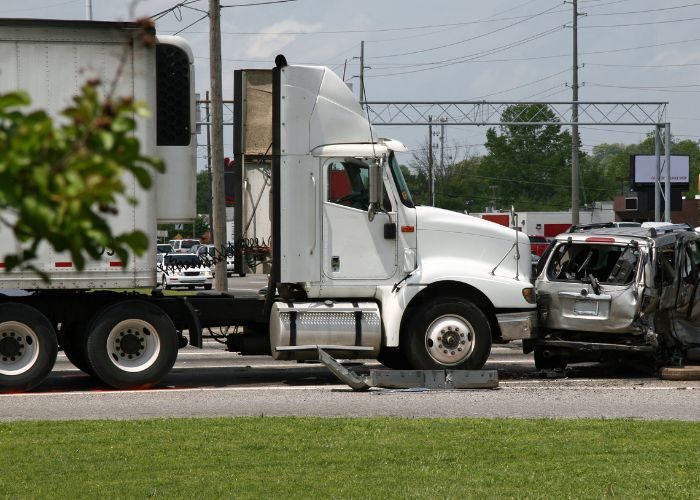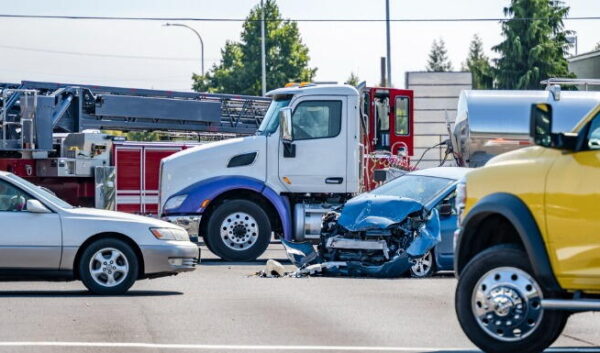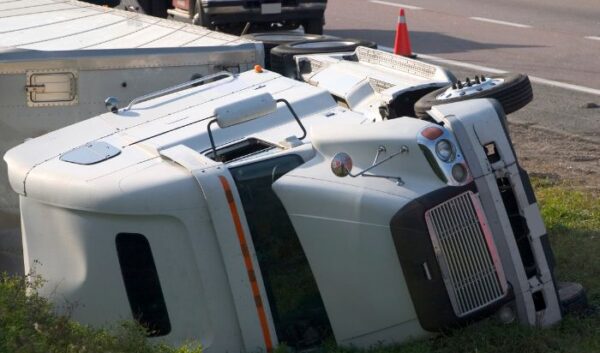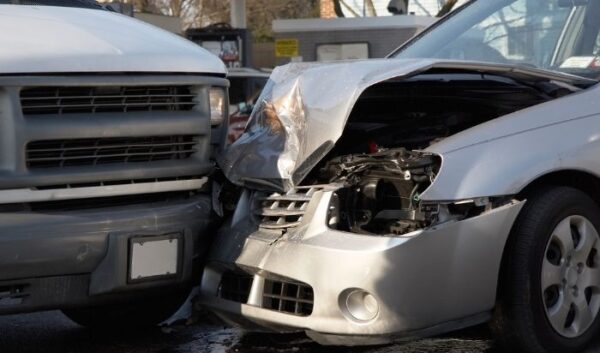Truck crashes might not be quite as common as car accidents, but they are more dangerous and usually result in debilitating injuries — if not fatalities. Big rigs, school buses, and tractor-trailers are much, much heavier than most cars. The resulting damage is higher and more serious injuries tend to occur when a car and truck collide on the road.
Truck accidents can be responsible for catastrophic injuries like head and brain trauma, concussions, blunt head trauma, lacerations to the face or scalp, spinal injuries, and paralysis. In mere seconds, an unsuspecting driver can collide with a commercial truck and face years of medical treatment, surgeries, rehabilitation, lost wages, and other unexpected losses.
In many cases, truck accidents are preventable and only occur due to reckless or careless actions of a driver, truck company, or similar party. When this happens and the crash results in injuries, the truck accident victims and their loved ones may be able to hire a North Carolina truck accident lawyer to hold the negligent party financially responsible for their losses.
In North Carolina in 2021, more than 16,300 truck crashes were reported, resulting in 150 fatalities and more than 3,800 injuries. Ward and Smith’s North Carolina lawyers specialize in car and truck accidents and other personal injury cases resulting in life-altering, catastrophic injuries. People considering legal action can rely on our knowledge of local laws, experienced approaches, and a history of helping our clients get justice.
Why You Need a North Carolina Truck Accident Attorney
Commercial trucks are only responsible for approximately 3.5% of all accidents, but truck accident cases tend to be more complicated. Semi-trucks and other commercial vehicles are 20 to 30 times heavier than passenger vehicles—a fully loaded commercial truck can weigh up to 80,000 pounds compared to a 3,000-pound car. Due to their extreme size and weight, they can cause deadlier crashes with a higher number of serious, life-altering injuries and fatalities.
In addition to debilitating injuries and ongoing pain, a commercial truck accident might cause medical debt, loss of short-term or long-term income, as well as other unexpected financial losses. A truck accident lawyer can help you pursue compensation for these losses by filing a lawsuit against the potentially responsible party.
Local accident lawyers in North Carolina should be able to help you navigate North Carolina accident laws that apply to trucking cases. They can also help you assess damages, gather evidence showing you were injured, handle sensitive matters like negotiations, and facilitate paperwork required by the state court system.
North Carolina Auto Accident Laws
Truck drivers are bound to additional federal laws specific to the commercial trucking industry. Many of these laws directly conflict with how trucking companies make money, hindering safety for other drivers. Sadly, thousands of people are injured and killed every year, often because of illegal (but common) trucking industry practices.
Trucking accident law is an area in which Ward and Smith attorneys have great experience: We can help truck accident victims and their loved ones better understand their legal options based on North Carolina laws. Whether the accident is on I-40 in the mountains or at the coast, on I-85 through Charlotte or Durham, or on the major East Coast trucking corridor of I-95, we can help.
North Carolina Is an At-Fault State
Drivers hurt in a motor vehicle accident caused by a negligent driver in North Carolina may be able to recover damages for medical bills, lost wages, and other related losses from the at-fault driver’s insurance company. The North Carolina Contributory Negligence Law bars drivers from collecting damages if they are partially at fault.
Contributory Negligence in North Carolina
North Carolina practices contributory negligence—a rule that prevents plaintiffs (or the injured party filing the lawsuit) from recovering any money if they contributed to the cause of the accident or their injuries.
The plaintiff is responsible for proving the negligent party owed them a duty of care, they breached that duty, and the plaintiff suffered harm because of it. The all-or-nothing nature of contributory negligence means even if the plaintiff was one percent negligent in the accident, they cannot recoup any damages from the defendant.
North Carolina is one of the few states that follow contributory negligence rules. These rules make it all the more important that you hire an experienced North Carolina truck injury lawyer, like those at Ward and Smith.
Statute of Limitations in North Carolina for Truck Accidents
The North Carolina statute of limitations dictates when a lawsuit must be filed so legal proceedings can begin. Car accident victims, including those in crashes involving trucks, must file a personal injury claim three years from the date of the injury, per North Carolina General Statutes Section 1-52, or the case could be dismissed.
The statute of limitations also defines requirements for wrongful death cases. In the event a loved one dies in a truck accident, the surviving family member must submit a claim no later than two years after the death occurred. Otherwise, they may not be able to recover compensation and pursue justice.
Significant monetary damages that may help pay medical bills, offset lost wages, and more could be at stake when laws are overlooked. North Carolina truck accident lawyers help ensure cases are filed on time so victims have a better chance of receiving compensation. It is in your best interest to seek legal help as soon as possible.
What To Do After a North Carolina Truck Accident
Emotions and adrenaline run high after a truck or car accident, but there are certain things you can do to take control of an unexpected situation.
Recommended actions might include:
- Get to safety: If the vehicle is still drivable, move it to the shoulder of the road and out of oncoming traffic.
- Call for help: Seriously injured parties should call 9-1-1 immediately, while non-injured parties should find urgent care as quickly as possible for a medical check-up. Physicians can rule out serious issues like head trauma, internal bleeding, concussions, and more.
- Exchange information with the other driver: Calmly exchange contact and insurance information with the other driver, being extra cautious about accidentally declaring fault. Reporting rules ask that you notify law enforcement if the crash resulted in a person’s injury or death, property damage of at least $1,000, or property damage to a vehicle seized under G.S. 20-28.3 for forfeiture in an impaired driving case.
- Document all evidence possible: Take photos and videos of vehicle and property damage at the accident scene, exchange information with witnesses, and highlight any traffic cameras with helpful footage.
- Call an accident attorney: Contact a local truck accident attorney who knows local laws and can assess your case for a possible lawsuit.
- Let your truck accident lawyer handle the rest: The state follows strict contributory negligence rules in truck accident cases. As such, it’s wise to have a trucking accident law firm take the lead in your case. A truck collision attorney can manage the legal process and deal with other parties, like insurance companies.
Proper steps after a truck accident can protect your legal rights or make you vulnerable to liability. Contacting a personal injury lawyer who understands proper protocol ensures a smoother recovery after a truck accident.
Who Might Be Liable in a North Carolina Truck Crash?
There are typically more third parties liable in truck accidents than in motor vehicle collisions. Truck crashes can happen because of defective equipment, negligent driving, or poor company training procedures, among other things.
Liable parties in a truck crash might include:
The Truck Driver
When looking at potential faults, truck drivers are the most obvious choice. Semis can cut off drivers and rear-end them if they were following too closely or the truck driver was not practicing safe driving skills. The truck driver’s employer and insurance company usually fight back: Evidence is essential.
Evidence might help prove whether the truck driver was violating any industry regulations, proof of intoxication or drug use, distractions like texting or using the phone, or tired or fatigued driving. A personal injury lawyer can request a truck driver’s employment records to see if there is any valuable evidence regarding previous moving violations, accidents, or reckless driving.
Trucking Companies or the Driver’s Employer
Trucking companies can also be held responsible for an accident, as the truck driver’s actions are not the only thing to blame. Trucking companies might be at fault if they failed to perform regular maintenance or necessary repairs, allowed a faulty truck to operate on the roads, or failed to run a background check on a new hire.
Sometimes, trucking companies fail to complete adequate employee safety training, hire an unfit driver, or allow a driver they know is incompetent to continue driving and compromise other people on the road. A trucking company’s action or inaction could make it liable for damages.
Truck Maintenance Company and Personnel
Regular maintenance, inspection, and repairs ensure trucks operate safely. Neglecting these responsibilities puts truck drivers and other motorists in jeopardy. If evidence shows mechanical failures like faulty brakes or worn-out tires are responsible, a trucking maintenance company and its mechanics, engineers, and other personnel could be vulnerable to a lawsuit.
Truck Manufacturer
Truck and parts manufacturers design and manufacture different commercial truck components, from the engine to the brakes and the battery to the axles. Sometimes, truck manufacturers produce defective parts, or the design breaks down, and things like brake failures, tire blowouts, or problems with the coupling system cause an unexpected crash. Faulty parts and other defects can seriously injure and kill innocent people. A North Carolina trucking accident lawyer can help victims pursue compensation.
Cargo Loading Team/Company
Cargo companies and personnel can make mistakes that lead to devastating consequences—another piece of the truck accident case puzzle. Commercial trucks are built on shuffling heavy cargo from place to place. Cargo loading errors happen when goods are not adequately secured or positioned, or there is uneven weight. The issues stem from operator negligence, inadequate staff training, insufficient or faulty equipment, or rush jobs.
Federal and state laws impose weight restrictions, load distribution requirements, and guidelines for securing cargo with appropriate restraints and equipment. When cargo companies overlook these details, life-changing accidents or wrongful death incidents happen.
Owner of the Trailer or Cab
Owners of commercial truck trailers or cabs also hold potential liability for truck accidents as they can contribute to faulty or defective equipment responsible for truck collisions, failed maintenance, or improper employee training.
What Can Be Used as Evidence in a Truck Accident Claim?
Ward and Smith North Carolina truck accident attorneys use various strategies in truck accident cases to recover compensation.
An experienced lawyer can use valuable information like the following to prove fault:
- Black box data can provide information about the moments leading up to a crash, like vehicle speed or whether the driver was braking before impact.
- Truck maintenance records that might reveal poor maintenance schedules.
- Driver and cargo log books outlining the driver’s schedule.
- Truck inspection reports and driving logs.
- Drug tests involving the truck driver’s past or current history.
- Video evidence from dash cams, cell phones, security footage, ring cameras, or surrounding businesses with video surveillance.
- Safety ratings of the trucking company and its equipment.
- Truck company policies regarding training and hiring procedures, driving schedules, and administration information.
Trucks and Trucking Regulations in North Carolina
North Carolina truck accident lawyers are experts on state trucking regulations. Knowing these laws can help build a successful case and uncover possible violations or liabilities where others might not see them.
Rules on Drivable Hours
Drivers in passenger vehicles are more likely to suffer a fatal injury in large truck crashes than truck drivers or passengers. To lessen unnecessary incidents involving large commercial trucks, federal law states that commercial operators are prohibited from driving commercial vehicles for more than 11 total hours within any consecutive 14-hour period.
Data shows that trucking accident rates double after eight hours of driving, so truck drivers cannot exceed 60 work hours after seven days or 70 hours in eight days. The clock restarts after 34 hours off of work, and once limits are reached, drivers must only complete non-driving duties like paperwork or unloading trucks.
Truck drivers must track their driving hours in electric logs, which have been mandatory since 2017.
Commercial Vehicle Classifications
Commercial drivers who operate large trucks (more than 26,000 pounds) must have a commercial driver’s license to haul cargo, hazardous materials, and multiple passengers, like 16 people or more. North Carolina has a classified licensing system.
Truck drivers must possess Class A, B, and C endorsements:
- Class A: Permits the operation of a commercial motor vehicle with a Gross Vehicle Weight Rating (GVWR), actual weight or registered weight over 26,000 pounds provided the GVWR, actual weight or registered weight of the vehicle is more than 10,000 pounds.
- Class B: Permits the operation of any single vehicle with GVWR, actual weight or registered weight over 26,000 pounds, or such vehicle towing a vehicle with GVWR, actual weight or registered weight of 10,000 pounds or less.
- Class C: Permits the operation of a commercial motor vehicle and any single vehicle with GVWR or registered weight of 26,000 pounds or less transporting hazardous materials requiring placarding or designed to carry 16 or more people.
Insurance Requirements for Big Rigs
Truck drivers must carry sufficient uninsured and underinsured motorist insurance to cover possible damages.
Not all states require liability insurance coverage, but North Carolina requires the following minimum liability coverage for automobiles:
- Bodily injury (one person): $30,000
- Bodily injury (two or more people): $60,000
- Property damage: $25,000
Note, however, that the minimum limits for liability insurance in North Carolina will be changing in 2025 with all new policies issued then.
For large trucks transporting non-hazardous materials, federal law requires the following minimum liability coverage:
- General freight trucks weighing under 10,001 pounds GVWR: $300,000
- General freight trucks weighing 10,001 pounds or more GVWR: $750,000
For large trucks transporting hazardous substances, the required minimum limits range from $1,000,000 to $5,000,000, depending on the material being transported. For example, under federal law, freight trucks weighing 10,0001 pounds or more GVRW and transporting oil must carry at least $1,000,000 in coverage.
Drug and Alcohol Rules and Testing
One of the most dangerous forms of negligence, drinking while driving a commercial vehicle, is illegal in North Carolina. When driving a commercial truck, the alcohol limit is 0.04 percent. There are five different levels of punishment for truck drivers found guilty of driving while under the influence, from fines to potential jail time.
Those injured by a truck driver under the influence should reach out to a personal injury lawyer for a legal consultation. Ward and Smith can help our fellow North Carolinians with qualified cases pursue damages to help with medical expenses, future medical expenses, lost wages, diminished earning capacity, pain and suffering, scarring or disfigurement, loss of use of part of the body, or the permanency associated with any continuing injuries.
Laws on Distracted Driving
Federal laws forbid texting and driving and other forms of distraction that can lead to unnecessary accidents.
According to § 20-137.4A, it is unlawful for truck drivers to operate a commercial vehicle while using a cell phone, texting, reading emails, or communicating with others. The law is specific to driving in public areas such as highways, and any violations are subject to penalties.
Working With North Carolina Truck Lawyers: Frequently Asked Questions
What kind of attorney handles North Carolina truck accident claims?
Personal injury lawyers help people recover from all types of catastrophic injuries from serious accidents, whether it be a car or truck accident, medical malpractice, defective products, and more.
Ward and Smith handles a broad range of personal injury lawsuits, including:
- Car, truck, and boat accidents
- Medical malpractice
- Nursing home and daycare abuse
- Premises and product liability
- Wrongful death
- Other catastrophic injuries
What do truck accident lawyers do?
Truck accident lawyers are also commonly referred to as personal injury lawyers who know local laws and have experience dealing with motor vehicle accident cases. They use specific strategies to gather the appropriate evidence to prove negligence and obtain a fair settlement or verdict for their injured client.
A top motor vehicle accident lawyer can make a significant difference in the lives of accident survivors. A successful settlement may put injured clients in a better position to seek and afford treatment for head, neck, and back injuries, head trauma, broken bones and soft tissue damage, chest injuries, internal organ damage, and more.
How much is my North Carolina trucking accident case worth?
Lawyers cannot guarantee a settlement or commit to specific settlement amounts, as a final judgment depends on a variety of factors. However, experienced big truck wreck lawyers can typically tell if a case has enough merit to recover compensation.
For example, Ward and Smith has helped clients recover millions of dollars. We helped a woman suffering from a traumatic brain injury recover $4.9 million after a truck accident.
While past cases cannot predict future results, they can help indicate the caliber of the truck accident attorney’s firm. This is one area, in particular, where experience is important.
How much do truck accident lawyers charge?
Personal injury firms like Ward and Smith operate on a contingency fee basis. There is no upfront payment to work with us or subsequent payment plans. We discuss a payment arrangement from the final judgment amount, usually a certain percentage.
We will only get paid if we win your case. To learn more about our services and rates, our firm offers a free consultation to see if there is a mutual fit.
Talk to a North Carolina Truck Accident Lawyer Today
Truck accidents are not isolated to one event–they can cause an immediate and surprising ripple effect on a person’s life. Trucking accident survivors can endure emotional trauma, short- or long-term physical injuries, job loss, changes to life goals, and more in one fell swoop.
Often, accident victims struggle financially for months or years before they pursue legal action. However, a highly qualified truck accident lawyer can help offer some relief by working with clients through their medical bills, outstanding debts, lost wages, and ongoing pain and suffering.
There is a lot of money lost, as victims might feel like they have no option but to take less than their claims are worth. We help survivors and their families pursue financial relief and save them from accepting lowball settlement offers from insurance companies.
Ward and Smith is a seasoned personal injury firm with over 100 years in practice. We routinely handle cases involving motor vehicle and truck accidents. We feel our firm’s experience with all types of auto accident cases is an advantage to potential clients.
Ward and Smith is an ally for accident survivors; we understand your struggles on multiple levels. We fight fiercely for your legal rights and fair compensation for your losses. Contact us for a free consultation and case review to get started.
Truck and 18-Wheeler Accident Representative Experience
Past results are no guarantee of future results. The summaries are not intended to indicate or guarantee that any of the same or similar results can be achieved in future matters; the outcome of a matter depends upon a number of factors. These summaries are intended only to provide general information about the experience of our attorneys. Summaries are drawn from 1992 through the present.















